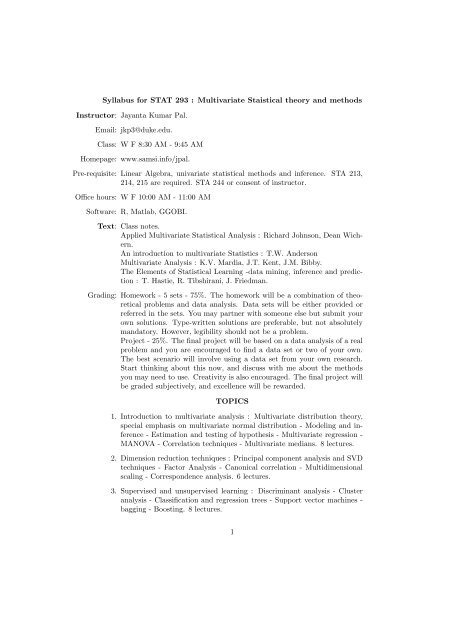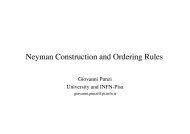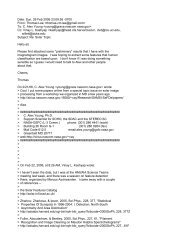Syllabus for STAT 293 - SAMSI Home Page
Syllabus for STAT 293 - SAMSI Home Page
Syllabus for STAT 293 - SAMSI Home Page
You also want an ePaper? Increase the reach of your titles
YUMPU automatically turns print PDFs into web optimized ePapers that Google loves.
<strong>Syllabus</strong> <strong>for</strong> <strong>STAT</strong> <strong>293</strong> : Multivariate Staistical theory and methods<br />
Instructor: Jayanta Kumar Pal.<br />
Email: jkp3@duke.edu.<br />
Class: W F 8:30 AM - 9:45 AM<br />
<strong>Home</strong>page: www.samsi.info/jpal.<br />
Pre-requisite: Linear Algebra, univariate statistical methods and inference. STA 213,<br />
214, 215 are required. STA 244 or consent of instructor.<br />
Office hours: W F 10:00 AM - 11:00 AM<br />
Software: R, Matlab, GGOBI.<br />
Text: Class notes.<br />
Applied Multivariate Statistical Analysis : Richard Johnson, Dean Wichern.<br />
An introduction to multivariate Statistics : T.W. Anderson<br />
Multivariate Analysis : K.V. Mardia, J.T. Kent, J.M. Bibby.<br />
The Elements of Statistical Learning -data mining, inference and prediction<br />
: T. Hastie, R. Tibshirani, J. Friedman.<br />
Grading: <strong>Home</strong>work - 5 sets - 75%. The homework will be a combination of theoretical<br />
problems and data analysis. Data sets will be either provided or<br />
referred in the sets. You may partner with someone else but submit your<br />
own solutions. Type-written solutions are preferable, but not absolutely<br />
mandatory. However, legibility should not be a problem.<br />
Project - 25%. The final project will be based on a data analysis of a real<br />
problem and you are encouraged to find a data set or two of your own.<br />
The best scenario will involve using a data set from your own research.<br />
Start thinking about this now, and discuss with me about the methods<br />
you may need to use. Creativity is also encouraged. The final project will<br />
be graded subjectively, and excellence will be rewarded.<br />
TOPICS<br />
1. Introduction to multivariate analysis : Multivariate distribution theory,<br />
special emphasis on multivariate normal distribution - Modeling and inference<br />
- Estimation and testing of hypothesis - Multivariate regression -<br />
MANOVA - Correlation techniques - Multivariate medians. 8 lectures.<br />
2. Dimension reduction techniques : Principal component analysis and SVD<br />
techniques - Factor Analysis - Canonical correlation - Multidimensional<br />
scaling - Correspondence analysis. 6 lectures.<br />
3. Supervised and unsupervised learning : Discriminant analysis - Cluster<br />
analysis - Classification and regression trees - Support vector machines -<br />
bagging - Boosting. 8 lectures.<br />
1
4. Theory of random matrices : Distribution of the eigenvalues and spacings<br />
- Tracy-Widom law - Application to high-dimension data - Regularization<br />
of covariance matrices. 4 lectures.<br />
5. High dimensional problems and curse of dimensionality : large p small n<br />
scenario. recent techniques including data mining. As time permits.<br />
2






